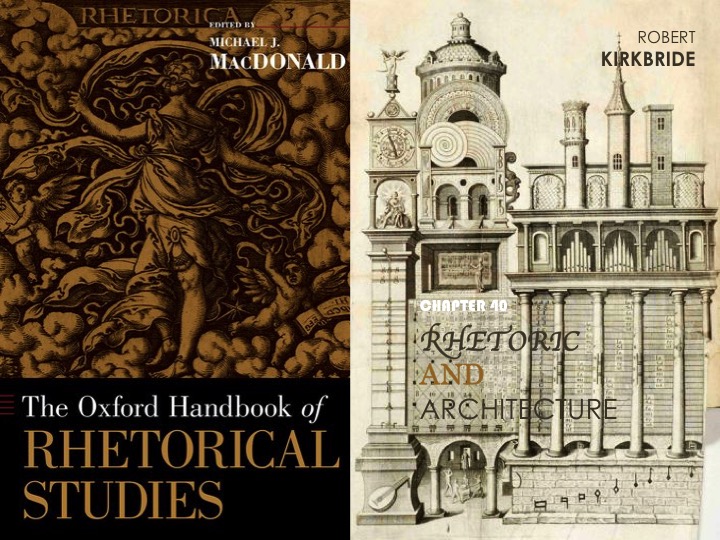New Oxford Handbook of Rhetorical Studies features Dean Kirkbride’s chapter “Rhetoric and Architecture”

In an age of global media networks and viral communication, rhetoric is once again contagious and communicable. Featuring 60 commissioned chapters by eminent rhetoric scholars from 12 countries, The Oxford Handbook of Rhetorical Studies offers students and teachers an accessible but sophisticated one-volume introduction to the multidisciplinary field of rhetorical studies.
Dean Kirkbride’s chapter, entitled Rhetoric and Architecture, touches on the professional, pedagogical, and poetic convergences of architecture and rhetoric in the Renaissance, and their joint contributions to shifting perceptions of truth and methods of inquiry. “For at least two and a half millennia,” he writes, “architecture and its ornament has offered perches for the birds of thought, informing personal and cultural identity by equipping the mind with figurative structures and placeholders for memory. During the European Renaissance, architecture furnished an expanding range of rhetorical performance, private and public, by practices inlaid in pedagogy and the fabric of everyday experience.”
The Handbook traces the history of Western rhetoric from ancient Greece and Rome to the present and explores the role of rhetoric in more than 30 academic disciplines and fields of social practice. This combination of historical and thematic approaches allows readers to chart the metamorphoses of rhetoric over the centuries while mapping the connections between rhetoric and law, politics, feminism, science, education, poetry, deconstruction, drama, digital media, literature, poetics, criticism, sophistry, critical race theory, philosophy, art, semiotics, psychoanalysis, composition, environment, and other topics. Chapters furnish the essential information expected of a handbook—discussion of key concepts, texts, authors, problems, and debates—while still posing challenging questions and advancing new arguments.
In addition to providing an engaging and comprehensive introduction to rhetoric in the European and North American context, the Handbook includes an introduction with summaries of all 60 chapters; a timeline of key works of rhetorical theory; a glossary of more than 300 rhetorical terms; translations of all passages in Greek and Latin; and extensive cross-referencing to help readers navigate chapters topically. These features will make this volume an invaluable resource for students and scholars in rhetoric, English, Classics, comparative literature, media studies, communication, and adjacent disciplines. Taken together, the chapters in this handbook show that rhetoric is not merely an art of style but an inventive, pragmatic, and critical art that operates in myriad academic fields and social contexts.
LINKS:
Oxford University Press: https://global.oup.com/academic/product/the-oxford-handbook-of-rhetorical-studies-9780199731596?cc=us&lang=en&
Via Amazon: https://www.amazon.com/Oxford-Handbook-Rhetorical-Studies-Handbooks/dp/0199731594